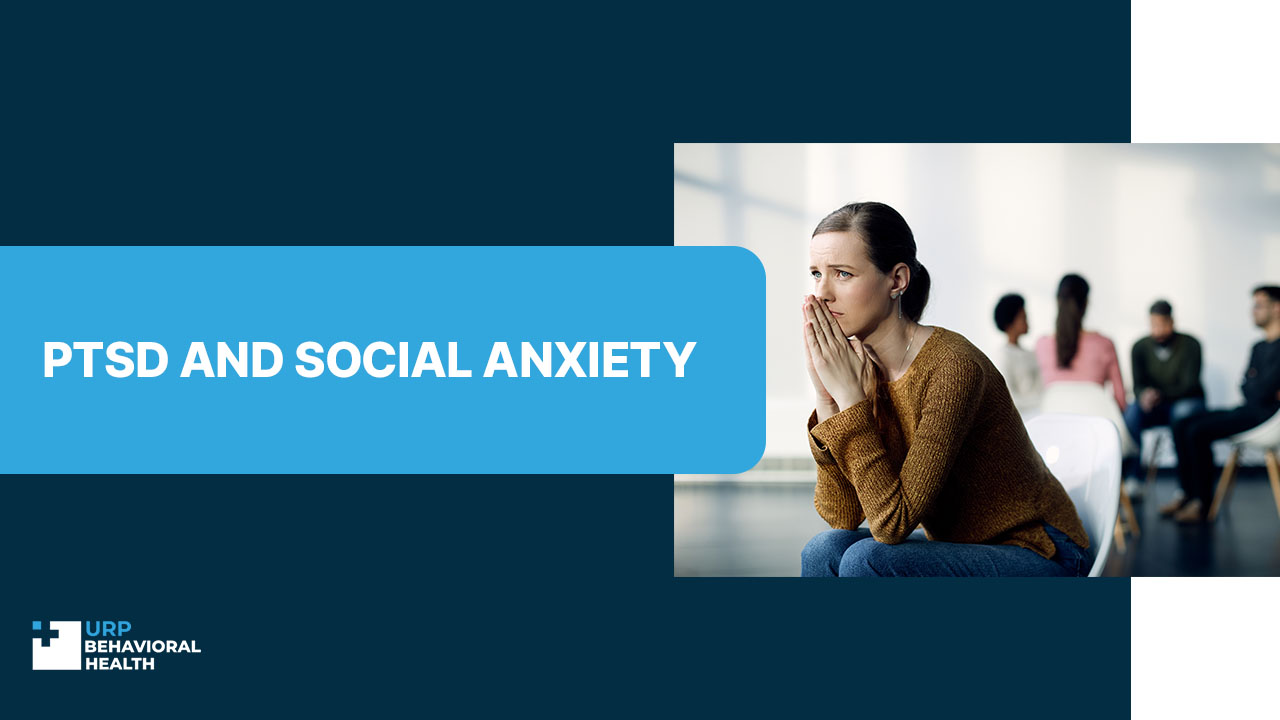
PTSD and Social Anxiety – Exploring the Link
Understanding the connection between PTSD and social anxiety is crucial for improving the health and well-being of those affected by these conditions. Post-Traumatic Stress Disorder (PTSD) and social anxiety are both serious mental health issues that can significantly impact an individual’s quality of life. PTSD is a mental health condition triggered by experiencing or witnessing a traumatic event, while social anxiety is characterized by an intense fear of social situations. Recognizing the link between these two conditions can lead to more effective treatments and better overall health outcomes for sufferers [1][2][3][4]. The interplay between PTSD and social anxiety highlights the importance of a comprehensive approach to diagnosis and treatment. By addressing both conditions simultaneously, healthcare providers can offer a more holistic and effective approach to patient care.
Individuals with PTSD often face numerous challenges that can exacerbate social anxiety. The stress and anxiety associated with PTSD can make social interactions feel overwhelming, leading to avoidance behaviors and increased isolation. Understanding these connections can help in creating more effective treatment plans that address both PTSD and social anxiety. Comprehensive care strategies that consider the multifaceted nature of these conditions are essential for improving patient outcomes and enhancing quality of life.
Contact our admissions team now to begin your path toward a brighter future.

What Is Social Anxiety?
Social anxiety, also known as social phobia, is a condition where individuals experience intense fear and discomfort in social situations. This fear can be overwhelming and can interfere with daily activities, relationships, and professional life. People with social anxiety often fear being judged, embarrassed, or humiliated in front of others. These fears can lead to avoidance of social interactions and can significantly impact an individual’s quality of life [1]. Understanding the symptoms and triggers of social anxiety is the first step towards effective management and treatment.
Common symptoms of social anxiety include excessive self-consciousness, fear of being watched or judged, and physical symptoms such as sweating, trembling, and nausea. These symptoms can be triggered by various social situations, such as speaking in public, meeting new people, or even everyday interactions like making eye contact. Recognizing and addressing these symptoms early can prevent social anxiety from worsening and affecting other aspects of life. Early intervention is crucial in managing social anxiety effectively and can help individuals build confidence and improve their social skills over time.
In addition to the psychological and emotional symptoms, social anxiety can also have physical manifestations. Individuals may experience rapid heartbeat, muscle tension, dizziness, and stomachaches when faced with social situations. These physical symptoms can further reinforce the fear and avoidance behaviors, creating a cycle that is difficult to break. Addressing both the emotional and physical aspects of social anxiety is essential for comprehensive treatment and management of the condition.
Can PTSD Cause Social Anxiety?
There is a significant overlap between PTSD and social anxiety, with many individuals experiencing both conditions simultaneously. PTSD can exacerbate the symptoms of social anxiety by increasing an individual’s overall level of anxiety and fear. The traumatic experiences that lead to PTSD can make social interactions particularly challenging, as individuals may fear judgment or rejection related to their trauma [2]. Understanding how PTSD can lead to social anxiety is essential for developing effective treatment plans that address both conditions.
Traumatic events can leave individuals feeling vulnerable and exposed, leading to heightened sensitivity to social interactions. This can create a cycle where the fear and anxiety associated with PTSD feed into social anxiety, making it difficult to engage in social activities. By recognizing this connection, healthcare providers can develop integrated treatment plans that address both PTSD and social anxiety, improving outcomes for individuals affected by these conditions.
Additionally, the hypervigilance and heightened arousal associated with PTSD can make social interactions feel more threatening and overwhelming. Individuals may become overly aware of their surroundings and constantly anticipate potential dangers, which can exacerbate social anxiety. This heightened state of alertness can make it challenging to relax and engage in social situations, further reinforcing avoidance behaviors and isolation.
Connection Between PTSD and Social Anxiety
Research has shown a strong connection between PTSD and social anxiety. Individuals with PTSD are more likely to develop social anxiety compared to those without PTSD. The stress and fear associated with PTSD can make social interactions feel threatening, leading to avoidance behaviors and increased social anxiety. Additionally, the symptoms of PTSD, such as hypervigilance and intrusive thoughts, can exacerbate the symptoms of social anxiety, creating a reciprocal relationship between the two conditions [3]. Understanding this connection is essential for providing comprehensive care to patients suffering from both disorders.
Both PTSD and social anxiety can lead to significant impairment in daily functioning, making it difficult for individuals to maintain relationships, perform at work, and engage in social activities. The combined effects of these conditions can create a cycle of avoidance and isolation, further exacerbating symptoms and reducing quality of life. By addressing the underlying causes and symptoms of both PTSD and social anxiety, healthcare providers can offer more effective and holistic treatment approaches.
The relationship between PTSD and social anxiety can also be influenced by the individual’s support system and coping mechanisms. Those with strong social support and effective coping strategies may be better equipped to manage their symptoms and engage in social interactions. Conversely, individuals with limited support and maladaptive coping strategies may struggle more with the combined effects of PTSD and social anxiety. Understanding these dynamics can help healthcare providers tailor treatment plans to the unique needs of each individual.
Reach out today and let us create a treatment plan designed around your needs.

Relieving PTSD and Social Anxiety Symptoms In The Moment
Managing symptoms of PTSD and social anxiety in the moment requires a range of coping strategies. Techniques such as deep breathing, mindfulness, and grounding exercises can help reduce immediate anxiety and bring a sense of calm. These strategies can be particularly useful in social situations where individuals may feel overwhelmed or triggered by their surroundings. Practicing these techniques regularly can help individuals build resilience and better manage their symptoms [4].
Other effective strategies include progressive muscle relaxation, visualization exercises, and positive self-talk. Engaging in activities that promote relaxation and reduce stress, such as yoga, meditation, and exercise, can also help manage symptoms in the moment. Developing a toolkit of coping strategies allows individuals to choose the most effective techniques for their unique needs and situations, enhancing their ability to navigate social interactions with greater confidence.
In addition to these strategies, seeking support from trusted friends or family members can provide immediate relief during challenging social interactions. Having someone to talk to or lean on can help individuals feel more grounded and less isolated. Support groups and therapy sessions can also offer valuable opportunities to share experiences and learn new coping techniques from others facing similar challenges.
Treatment Options for PTSD and Social Anxiety
Treating PTSD and social anxiety often requires a multifaceted approach. Psychotherapy, including cognitive-behavioral therapy (CBT) and exposure therapy, is commonly recommended to address the underlying trauma and anxiety. These therapies can help individuals challenge and change negative thought patterns, reduce avoidance behaviors, and develop healthier coping strategies. Group therapy and support groups can also be beneficial, providing a sense of community and shared understanding [2]. Combining these treatments can provide comprehensive care that addresses both conditions.
In addition to therapy, lifestyle changes such as regular exercise, healthy eating, and adequate sleep can support mental health and reduce symptoms of PTSD and social anxiety. Building a strong support network of friends, family, and mental health professionals is also crucial for recovery. By taking a holistic approach to treatment, individuals can improve their overall well-being and develop the skills needed to manage their symptoms effectively.
Alternative therapies, such as art therapy, music therapy, and animal-assisted therapy, can also provide additional support for individuals with PTSD and social anxiety. These therapies offer creative and engaging ways to process emotions and reduce stress. Incorporating a variety of therapeutic approaches can enhance treatment outcomes and provide a more comprehensive support system for individuals.
Don’t wait - confidential help is available right now for you or your loved one.

Conclusion
Recognizing and addressing the connection between PTSD and social anxiety is vital for improving the health and well-being of those affected. Both conditions can have a profound impact on an individual’s quality of life, making it essential to understand how they interact and influence each other. By understanding the link between PTSD and social anxiety, healthcare providers can develop more effective treatment strategies that address both conditions simultaneously. If you or someone you know is struggling with PTSD and social anxiety, seeking professional help is crucial. Early intervention and comprehensive treatment can significantly improve outcomes and enhance quality of life [1][2][3][4]. URP Behavioral Health offers specialized care and support for individuals dealing with these challenging conditions, emphasizing the importance of integrated treatment approaches for optimal recovery.
Effective treatment for PTSD and social anxiety requires a collaborative approach that addresses both the psychological and social aspects of these disorders. By providing comprehensive care that includes therapy, lifestyle changes, and support networks, individuals can achieve better mental health and improve their ability to engage in social interactions. If you or a loved one are experiencing symptoms of PTSD or social anxiety, do not hesitate to seek professional help. Early diagnosis and comprehensive treatment are key to managing these conditions and improving overall well-being. With the right support and interventions, individuals can build resilience, develop healthier coping mechanisms, and lead more fulfilling lives.
Sources
- [1] Social Anxiety Disorder and PTSD. https://pubmed.ncbi.nlm.nih.gov/20721907/
- [2] “The Relationship Between PTSD and Social Anxiety”. https://pubmed.ncbi.nlm.nih.gov/32361167/
- [3] “Is Social Anxiety Really PTSD?”. https://www.psychologytoday.com/us/blog/targeted-parenting/202001/is-social-anxiety-really-ptsd-detail-weve-been-missing
- [4] “Understanding PTSD and Social Anxiety”. https://psycnet.apa.org/record/2020-38233-001
















